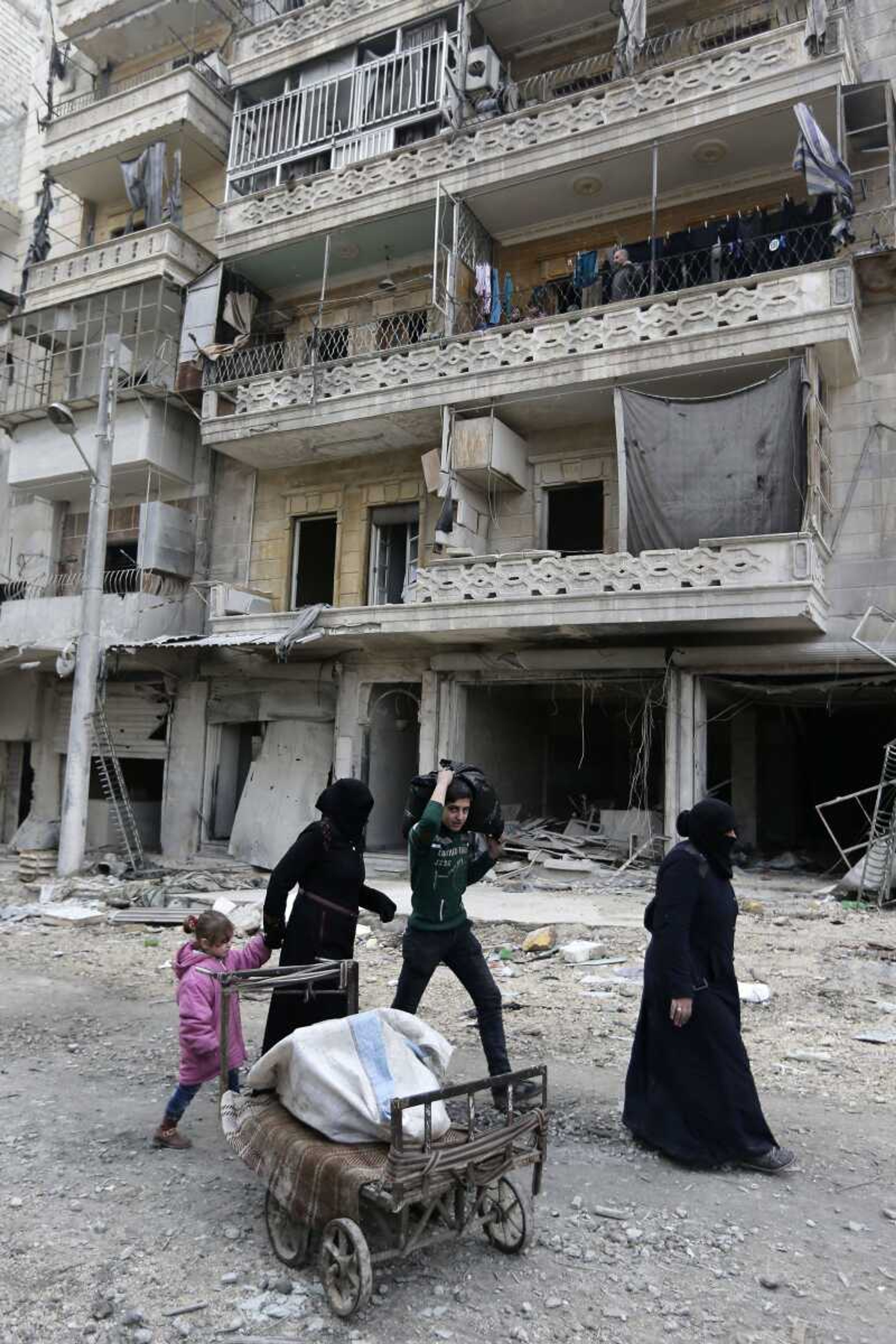In midst of Aleppo wreckage, a Syrian family returns home
ALEPPO, Syria -- The street looks as if it was hit by an earthquake, and the bombed-out building in a former rebel-held northeastern neighborhood of Aleppo is deserted except for the second-floor apartment where Abdul-Hamid Khatib and his family are staying...
ALEPPO, Syria -- The street looks as if it was hit by an earthquake, and the bombed-out building in a former rebel-held northeastern neighborhood of Aleppo is deserted except for the second-floor apartment where Abdul-Hamid Khatib and his family are staying.
There is no electricity or running water. The apartment windows are covered with nylon sheets, and a hole caused by a shell in the sitting-room wall is closed with a piece of metal, pierced by the exhaust pipe for the wood-burning heater.
Khatib and his family are the only occupants of the six-story building, and they keep its main gate locked with a metal chain, fearing looters. At night, they fumble around the two-bedroom apartment with candles.
But the family has nowhere else to go.
The 56-year-old blacksmith had been jobless for months and could not afford to keep paying rent. He was worried their apartment in Aleppo's Ansari neighborhood would be looted if they stayed away.
"A few days ago, a man who brought some stuff over told me, 'Is it possible that you live here?' I said, 'Where can we go? At least this is our house, and no one will ask us to leave,'" said Hasnaa, Khatib's wife.
Life and war have been unkind to the Khatib family. The eldest son, Mohammed, was killed in the bombardment of east Aleppo in 2013, and their granddaughter Hasnaa, 4, was killed a year later by a bullet as she played on the balcony of her parents' apartment.
Their son Mahmoud died at work of severe burns while welding a metal container filled with gas.
Since rebels fighting to topple President Bashar Assad stormed east Aleppo in July 2012, the family had to leave the house twice to move to safer areas before returning home.
But in August, when government forces intensified their offensive on east Aleppo, an airstrike near their home forced them to flee a third time.
"It was so dangerous, and our kids were terrified, so we could not tolerate it anymore. We used to tell the gunmen to move away from here, but they would not listen to us," Abdul-Hamid said.
In December, government forces and their allies took control of east Aleppo, bringing the city under state control in the biggest victory for Assad since the country's war began in March 2011.
The Khatib family -- like many of east Aleppo's residents -- were taken to shelters in the village of Jibrin, just south of Aleppo, where they spent a week before returning to their hometown in early January.
Having little money left to rent an apartment, they returned to their abandoned home in Ansari and fixed it as much as possible. They found many of their belongings looted, including the refrigerator, stove, a microwave and seven gas cylinders. When asked who was behind the looting, Khatib blamed rebels and pro-government gunmen.
The couple lives in the apartment with their daughter Rasha, daughter-in-law and two grandchildren, Abdul-Hamid and Rimas.
Their apartment appears in relatively good shape compared with nearby housing units. The buildings on each side of theirs are uninhabitable.
Most buildings in their area are a pile of metal and stones or so damaged they're no longer suitable to live in.
Their home attracts attention from curious passersby, as it's the only apartment on the street with washed laundry hanging from the balcony and wood smoke coming from the heater.
Thousands of other families from east Aleppo have returned to their homes because they have nowhere else to go.
One neighboring family came to check their home about 50 yards away and found it could collapse at any moment.
Despite everything, Abdul-Hamid Khatib is optimistic the situation in his city only can get better.
But his wife, Hasnaa, wishes they had fled Syria and joined the nearly 4 million refugees who settled in neighboring countries.
"I feel life was so unjust to me. Although I am alive, I feel as if I am dead," she said, sitting on a plastic chair in her living room. "I wish we left at the beginning of the crisis, even if we had to stay in the street."
Connect with the Southeast Missourian Newsroom:
For corrections to this story or other insights for the editor, click here. To submit a letter to the editor, click here. To learn about the Southeast Missourian’s AI Policy, click here.










